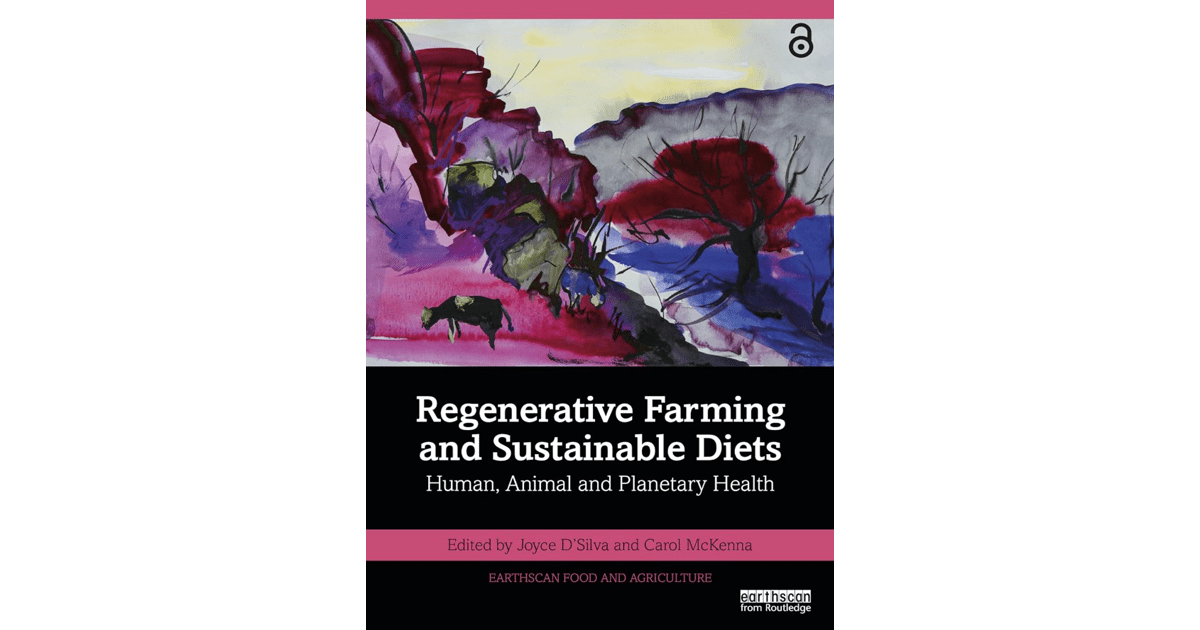
Jan 04, 2025 “Regenerative Farming and Sustainable Diets: Human, Animal and Planetary Health”
The anthology. resulting from a conference organized by Compassion in World Farming, Regenerative Farming and Sustainable Diets (2025, Routledge Press) and edited by Joyce D’Silva and Carol McKenna, includes thirty-four chapters addressing how society could produce, distribute and consume food for the well-being of humans, animals and the environment. To develop a sustainable food system, the various authors call for substantial changes in farming and food consumption. The book, which Jane Goodall recommends as a “must read,” promotes a transition to regenerative farming as a means to foster sustainable, healthy and secure diets while protecting the welfare of animals. Chapters discuss broadly ranging issues from climate change and biodiversity conservation to animal sentience and intensive farming to the role of financial markets and food businesses. The book concludes with chapters discussing potential routes in policy and practice to transform the global food system and achieve real-world change.
The authors make the case for shifting away from industrial animal agriculture to nature-friendly, regenerative farming approaches, reducing meat consumption, and promoting plant-based diets. They articulate a path toward rewilding soil by returning animals to the land as part of mixed rotational farms.
The well-established authors associate food systems with key global problems, including deforestation, soil degradation, water pollution and habitat loss for wildlife. Henry Dimbleby, founder of the Sustainable Restaurant Association, explains that whereas 12,000 years ago, humans were a tiny proportion of biomass compared to wild animals, now the combined weight of animals bred for food dwarfs that of the combined weight of all wild mammals and birds. Further, he explains that “Globally, the food system is the second‑biggest emitter of greenhouse gases (after the fuel industry), and the primary cause of deforestation, drought, freshwater pollution, biodiversity loss and the collapse of aquatic wildlife.”
The book has several thematic sections, each with a different focus on aspects of the transformation of food systems. In the “Global Agreement on Food, Climate, and Animal Welfare” section, Philip Lymbery argues for an international agreement integrating food production with climate action and animal welfare to ensure a sustainable future for the next generations. In “Soil Regeneration for Climate Security,” Rattan Lal explores regenerative soil management as a critical strategy for minimizing extinction risks and ensuring climate resilience. Shireen Kassam articulates how plant-based diets improve human health outcomes and reduce the environmental footprint of food production. Shireen’s sister, Laila, and father, Amirali, argue that “regenerative agriculture does not require the integration of farmed animals or their products for soil health, climate sequestration or any other ecologically based reason. We highlight the destructive nature of the dominant tillage‑based agriculture paradigm and put forward an alternative paradigm of Conservation.”
Meanwhile, the book argues for regenerative farming practices, such as reduced or no-tillage, composting, and crop rotation, to help maintain and improve soil health by fostering a rich diversity of microorganisms. These microorganisms play a crucial role in nutrient cycling, pest control, and overall ecosystem resilience. By avoiding synthetic chemicals and disturbing the soil less frequently, regenerative farming creates a more hospitable environment for beneficial microbes, fungi, and insects that contribute to soil fertility and plant health. One chapter by University of Winchester professor Andrew Knight addresses the environmental benefits of vegan pet food, reducing the demand for animal-sourced products to feed several billion pets.
In “Sentience and Farming Practices,” animal welfare scientists Donald Broom and John Webster explore the ethical implications of animal sentience, advocating for farming practices that respect animal welfare while promoting sustainable agriculture. Ecologist Carl Safina examines how sentient minds can inform conservation efforts and improve animal welfare in farming systems. In “Agroecology’s Role in Climate Mitigation,” Janet Maro builds on a case from Tanzania where agroecological practices allow communities to adapt to climate change while improving their local food security. In a chapter about the reform of financial architecture. Jennifer Clapp recommends countering corporate concentration in the global food system by shifting financial investments away from industrial agriculture toward more sustainable models. She notes, “Only six firms control 80% of the global agricultural chemical market and 60% of the global seed market. Just four firms control the global grain trade – Archer Daniels Midland, Bunge, Cargill and Louis Dreyfus. Collectively, they account for 50%–70% of the international trade in staple grains.”
Regenerative agriculture encourages the use of polyculture (growing multiple crops together) and crop rotation, which increases plant diversity on farms. This diversity helps prevent the build-up of pests and diseases that target specific crops, reducing the need for chemical pesticides. Diverse plant species also provide a wider range of habitats and food sources for various animals, insects, and pollinators, contributing to a more balanced ecosystem.
Leslie Barcus is a member of WBI’s Board and the CEO of Nuzzles and Co, an animal shelter in Park City, Utah. Steven Hansch is a humanitarian aid specialist with extensive field, management, and evaluation experience. He teaches at several universities and serves on several nonprofit boards involved in human development and humanitarian aid.
Book Available at: https://www.routledge.com/Regenerative-Farming-and-Sustainable-Diets-Human-Animal-and-Planetary-Health/DSilva-McKenna/p/book/9781032684321.
Open Access Download Link: https://www.taylorfrancis.com/books/oa-edit/10.4324/9781032684369/regenerative-farming-sustainable-diets-joyce-silva-carol-mckenna


